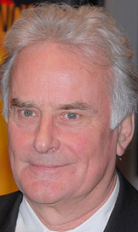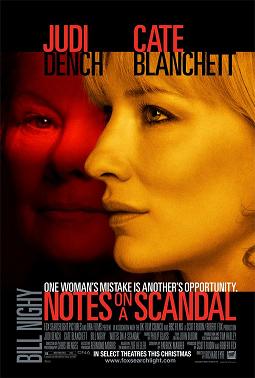
Main Page
Interviews Menu
Alphabetical Menu
Chronological Menu



Richard Eyre directs Notes on a Scandal about Sheba (Cate Blanchett), a high school teacher who confides in Barbara (Judi Dench), a colleague and neighbor who witnesses her secret affair with one of her students, Steven, played by Andrew Simpson. Based on the novel by Zoe Heller. Richard Eyre has directed films such as Stage Beauty and Iris and directed plays for the Royal National Theater. This is Andrew Simpson's first major role in a feature film; he had a small role in Song for a Raggy Boy. I had the privilege to interview both Richard Eyre and Andrew Simpson together. Fox Searchlight Pictures will release Notes on a Scandal on December 27th, 2006. NYC MOVIE GURU: How did you end up directing Notes on a Scandal? RE: I’ve done the film Iris and Scott Rudin was one of the producers. After that, Scott said to me, “I have an idea for another project for you and Judi [Dench]. Have you read Notes on a Scandal?” which I had read when [it was] published. He said, “I’m thinking of asking Patrick Marber to write the screenplay”. When I was running the National Theater, I had commissioned Patrick. He came to do a workshop in the National Theater studio which is a, sort of, experimental add-on. He did this workshop for play. I commissioned the play, which was called “Dealer’s Choice”. Then I commissioned another play, which was “Closer”. So, I produced his first two plays [and] I let him direct [them], but I had always wanted to direct his work. When Scott [Rudin] said to me [that] Patrick is going to do the screenplay and I had loved the novel, so, what’s to resist? NYC MOVIE GURU: How long did it take until you to shoot the film? RE: The first draft I read was in January of [2005] and we were shooting in August [that year]. NYC MOVIE GURU: What’s the main difference between the novel and the film? RE: The novel is told primarily from Barbara’s perspective. It’s [in] first person [and] utterly subjective. It’s a classic case of the unreliable narrator. You gradually realize that the person telling you the story is telling you a whole lot of lies and you, sort of, sense what the real story is in parallel. Of course, you can’t do that in a movie because the moment you put the narrator on screen, you’re, sort of, objectifying it. What Patrick [Marber] had to do was to try to find a way of unfolding the story and saving certain events, like the discovery of the affair, until later in the film. In the novel, you discover [it] pretty early on. Also, [it’s important] to have the best of both worlds, so that you’re seeing all the characters, but, at the same time, you’re tilting it toward Barbara’s point of view. That’s where the voice-over is very helpful—the music is very much the voice of Barbara’s inner thoughts. Also, you have to render each character independent [and] give them a, sort of, autonomous life rather than just filtering them through the perspective of Barbara. NYC MOVIE GURU: Andrew, what was it like finding out you got the role of Steven? AS: I was actually sitting on my bed and it was during the holidays. I woke up and the phone was beside my bed and don’t know why it was, but it turned out Richard [Eyre] was going to ring me to tell me [the good news]. He told me that I got the part, which was pretty unbelievable. It’s mainly down to the people involved how easy it was to act in this role. NYC MOVIE GURU: How did you feel during the sex scene with Cate Blanchett? AS: It was fine. I hope that’s not what sex is like—cool, two night shoots, 30 people watching you and telling you to stay in the light [and] to move your hand [here and] there. It was also challenging to try to maintain a performance in the conditions that I had never acted in before. It’s always good to challenge yourself and I enjoyed it. NYC MOVIE GURU: Why do you think Steven decided to yield to the temptation of Sheba? AS: He wanted it. He made the move, but that’s not to say that he knew he was out-of-his-depths when he found out. Basically, he doesn’t give a shit. [Expulsion] is the first thing he thinks of when the new comes out at all about [him]. I think that he’s immature emotionally and, so, maybe he doesn’t have time to, sort of, reflect on it and what kind of damage it could to do him. NYC MOVIE GURU: How far-fetched is Steven’s relationship with Sheba? AS: He has no idea what he’s getting into. He thinks it’s fun. The sex—it’s brilliant. It’s every boy’s dream, I think. Most of my friends dreamed about it [with] one of the teachers, so, it’s not that [far-fetched]. NYC MOVIE GURU: Richard, did you discuss Steven’s character with the cast? RE: We had long discussions about his character—how generous he was, how manipulative he was, how charming he was [and] whether the charm was genuine or superficial, how attractive he was, how intelligent he was. All those things [were discussed]. Similarly, with [Sheba], [there was] a lot of back-story. I had two weeks rehearsals with Judi [Dench] and Cate [Blanchett] [and] a few days with Andrew [Simpson] and with Bill [Nighy]. It was just mostly sitting around my kitchen table in London [and] just, kind of, talking about it, so that, gradually, you build up a dossier. It’s like sitting around [talking to] mutual friends. Gradually, you treat them as if they’re real people. NYC MOVIE GURU: How did you get composer Phillip Glass involved? RE: There’s a certain awkward process with movie scores. It happens, universally now, that you put on a temporary score which is a, sort of, collage of other people’s music. So, we had a score that was made up of Thomas Newman, Alexander Desplat, [and] some Phillip Glass. Then you say to the composer, “Look, we’ll watch this movie and write a score listening to somebody else’s music”—they’re own music written for a completely different film. So, the first thing [Phillip Glass] did was say, “Could I watch the movie without the temp score?” Phillip has a very voice and you hear a few bars of [his] music and you know it’s Phillip Glass. I thought that this was a really good thing for this film because if that voice can be a line to Barbara’s voice, then it’s a fantastically valuable tool. Nowadays, you get a keyboard with all of the instruments sampled, so you could hear a, sort of, approximation to an orchestral score early on. NYC MOVIE GURU: Would you consider Phillip Glass to be domineering? RE: “Domineering” is the last word that I would use to describe Philip [Glass]. He’s actually quite an enchanting man. I think he’s a great composer. NYC MOVIE GURU: Did you consider including any aftermath scenes? RE: The worst scenes were the aftermath scenes. They were just ultimately irrelevant. What Patrick [Marber] and I decided was that [Steven] wouldn’t be particularly affected. He’d be upset that [Sheba would] be gone to prison, but it’s no skin off of his nose, [so-to-speak]. He had great sex with his very sexy teacher, yet it’s a shame [that] it ended badly [because] of that bitch, [Barbara]. He was angry about that, but he would get on with his life. He’s not going to be traumatized—that’s what we thought. NYC MOVIE GURU: Richard, do you think this film will get any Oscars? RE: I don’t know. When I did Iris, I never [even] dreamt of that and that got 3 Oscar nominations. There’s a very high proportion of voters who are actors. I can’t believe that they wouldn’t think that Judi [Dench] and Cate [Blanchett], not-to-mention Andrew [Simpson] and Bill [Nighy], have something special. NYC MOVIE GURU: Do you feel patriotic about making a good British film? RE: I don’t think of it in patriotic terms. I never think of art as any form of being a sort of expression of national character. You’re just grateful if you see anything good from anywhere in the world. Main Page Interviews Menu Alphabetical Menu Chronological Menu ______________________________________________________ |
The NYC Movie Guru
themovieguru101@yahoo.com
Privacy Policy